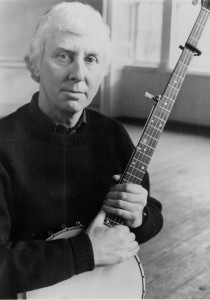 KNOWN universally as “the quiet man of Scottish folk”, Iain MacKintosh was an understated yet highly polished and professional performer, either in his solo appearances, accompanied only by his instrument of choice, the long-necked five-string banjo, or alongside a more ebullient partner such as Hamish Imlach or Brian McNeill. A relatively late starter in his singing career, he nevertheless made more than a dozen albums over three-and-a-half decades, possessing an ear for a fine song by the likes of Alex Campbell, Eric Bogle, Adam McNaughtan and particularly Harry Chapin, as well as writing a few telling songs of his own.
KNOWN universally as “the quiet man of Scottish folk”, Iain MacKintosh was an understated yet highly polished and professional performer, either in his solo appearances, accompanied only by his instrument of choice, the long-necked five-string banjo, or alongside a more ebullient partner such as Hamish Imlach or Brian McNeill. A relatively late starter in his singing career, he nevertheless made more than a dozen albums over three-and-a-half decades, possessing an ear for a fine song by the likes of Alex Campbell, Eric Bogle, Adam McNaughtan and particularly Harry Chapin, as well as writing a few telling songs of his own.
Iain Campbell MacKintosh was born in Glasgow in 1932, attended Glasgow High School and, after National Service in the RAF, during which he acquired some basic guitar skills, he entered the family pawnbroker’s and goldsmith’s business, which he ultimately ran with his wife, Sadie. He was, however, becoming increasingly fascinated by folk music and in 1970, inspired by seeing Pete Seeger play Glasgow City Hall, he quit the business for a full-time music career.
He would later comment: “Every night I don’t have to worry that the police will phone to say, ‘You’re the keyholder, the pawnshop alarm is ringing, you’ll have to come down here.’ That’s a night off for me.”
His earliest appearances were as part of the Islanders, who were then resident at the Bothy Folk Club in Glasgow’s Bath Street, and one of his earliest songs – The Pawn Song, based on his working life – featured on one of their albums. He also played with the Skerries and the Other Half and worked as a session musician for the likes of the Gaberlunzie and Watt Nicol. Eventually, however, he decided to go solo – the path of the folk troubadour that would take him Germany, the Netherlands, Denmark (where he was a much loved regular at Tønder folk festival), Bermuda and North America.
While he made the five-string banjo his main instrument, he’d also learned the Highland pipes as a youngster and he went on to master the harmonica and concertina. His quiet-spoken approach and self-deprecatory humour made him an instant hit with audiences. As another Glasgow singer, Adam McNaughtan, recalled, “In Toronto he could happily chat to audiences about his auntie in Balornock, confident that nine-tenths of his audience were still Glaswegians in their own minds. In Tønder, Denmark, he had become so much a part of the family that in 2004, after he had stopped singing, he and his wife, Sadie, were invited to enjoy the festival as guests.”
He recorded albums in Scotland and in Germany and, whatever he sang, he displayed, as his fellow singer-songwriter Allan Taylor put it, “the remarkable gift of making every song his own, regardless of the writer”. Among those songs he particularly made his own were Billy Connolly’s nostalgic I Wish I Was in Glasgow, McNaughton’s The Glasgow I Used to Know and Harry Chapin’s wry Flowers Are Red.
He made several of his albums with the Greentrax label, whose founder, retired police inspector Ian Green, had first met him during the Sixties when he was running “Fuzz Folk” – the Edinburgh police Folk club. MacKintosh’s warm way with a crowd prompted Green to book him regularly for the club.
Having established himself as a solo artist, Iain formed successful partnerships with two contrastingly extrovert personalities, firstly with the late Hamish Imlach, then with Brian McNeill, both of whose full-on approaches never eclipsed Iain’s lower-key yet direct communication.
Sadly Iain developed throat cancer, then Parkinson’s disease, which put paid to his performing career, though he continued to thrive on family life with his wife, Sadie, whom he’d married in 1956, and their two daughters and grandchildren, and he would crop up at folk clubs just for the crack.
When he finally succumbed to illness in August, 2006, Adam McNaughtan wrote in an obituary for him inThe Living Tradition magazine, “A gentleman, says the old definition, is someone who owns a banjo and doesn’t play it. Iain MacKintosh made nonsense of that definition. He made the five-string banjo a gentle man’s accessory.”
Iain had a huge zest for his life on the road as a performer. As he declared in one of his best-known songs: “… if I had to do it all again, I wouldn’t change a thing.”
Written by Jim Gilchrist 2015